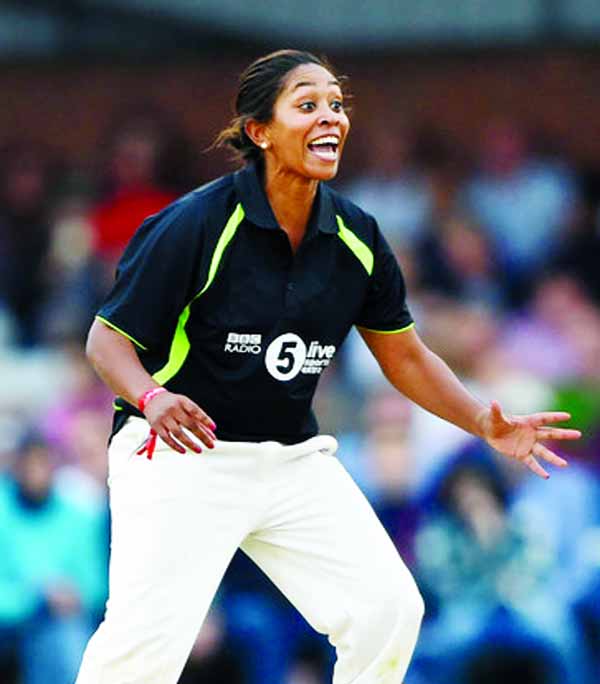
BBC Online :
Ex-England cricketer Ebony Rainford-Brent says she is “very jealous” of the minority representation in football.
Rainford-Brent was the first black woman to play cricket for England and is one of only four Black, Asian and minority ethnic women to have done so.
As Surrey’s director of women’s cricket, she has launched a scholarship programme to increase participation.
“We have to look at the pipeline – are any players coming through?” she said on BBC Radio 5 Live.
Isa Guha, Sonia Odedra and Sophia Dunkley are the other BAME women to have played for England.
“When I listen to football with all its problems, I’m still very jealous of the sport because we see representation,” said Rainford-Brent.
“I think the mass level of it means it has a lot of issues that get thrashed out in the media.
“There is no diversity in women’s cricket, really.”
The England and Wales Cricket Board announced a major investment in 2019 as a part of a five-year plan to increase participation.
“We passionately believe cricket at all levels is a game for everyone,” an ECB spokesperson said.
“There is a lot more to do to help and support women from a range of different backgrounds to play and enjoy the game.”
Surrey initially created 12 scholarships but doubled the number because of the amount of interest.
Rainford-Brent said the lack of visibility of cricket, particularly on free-to-air television, meant the sport “did not exist” for some children.
“We as a sport are disconnected from inner cities – that’s not just a black issue, that has socio-economic implications,” Rainford-Brent added.
“We, as a sport, have a lot of work to do.”
The Hundred, a new format of 100 balls per side, was set to be shown on the BBC but the competition has been postponed because of the coronavirus pandemic.
However, there will still be highlights of men and women’s international cricket across the summer on BBC Two and the BBC Sport website.
“Our urban investment programme has seen cricket facilities installed in inner-city areas, including the first Urban Cricket Centre in Leyton, providing access to our sport for a range of local communities,” the ECB spokesperson added.
“Our schools strategy already seeks to deliver cricket in primary schools with a higher percentage of BAME pupils, and the new schools strategy, due to be launched later this year, will build on this work.”
Former England opener Michael Carberry had previously told BBC Sport racism was “rife” in cricket.
The ECB has since discussed the issues raised by Carberry and others at a board meeting and will work to engage with community leaders and black influencers.
Ex-England cricketer Ebony Rainford-Brent says she is “very jealous” of the minority representation in football.
Rainford-Brent was the first black woman to play cricket for England and is one of only four Black, Asian and minority ethnic women to have done so.
As Surrey’s director of women’s cricket, she has launched a scholarship programme to increase participation.
“We have to look at the pipeline – are any players coming through?” she said on BBC Radio 5 Live.
Isa Guha, Sonia Odedra and Sophia Dunkley are the other BAME women to have played for England.
“When I listen to football with all its problems, I’m still very jealous of the sport because we see representation,” said Rainford-Brent.
“I think the mass level of it means it has a lot of issues that get thrashed out in the media.
“There is no diversity in women’s cricket, really.”
The England and Wales Cricket Board announced a major investment in 2019 as a part of a five-year plan to increase participation.
“We passionately believe cricket at all levels is a game for everyone,” an ECB spokesperson said.
“There is a lot more to do to help and support women from a range of different backgrounds to play and enjoy the game.”
Surrey initially created 12 scholarships but doubled the number because of the amount of interest.
Rainford-Brent said the lack of visibility of cricket, particularly on free-to-air television, meant the sport “did not exist” for some children.
“We as a sport are disconnected from inner cities – that’s not just a black issue, that has socio-economic implications,” Rainford-Brent added.
“We, as a sport, have a lot of work to do.”
The Hundred, a new format of 100 balls per side, was set to be shown on the BBC but the competition has been postponed because of the coronavirus pandemic.
However, there will still be highlights of men and women’s international cricket across the summer on BBC Two and the BBC Sport website.
“Our urban investment programme has seen cricket facilities installed in inner-city areas, including the first Urban Cricket Centre in Leyton, providing access to our sport for a range of local communities,” the ECB spokesperson added.
“Our schools strategy already seeks to deliver cricket in primary schools with a higher percentage of BAME pupils, and the new schools strategy, due to be launched later this year, will build on this work.”
Former England opener Michael Carberry had previously told BBC Sport racism was “rife” in cricket.
The ECB has since discussed the issues raised by Carberry and others at a board meeting and will work to engage with community leaders and black influencers.

